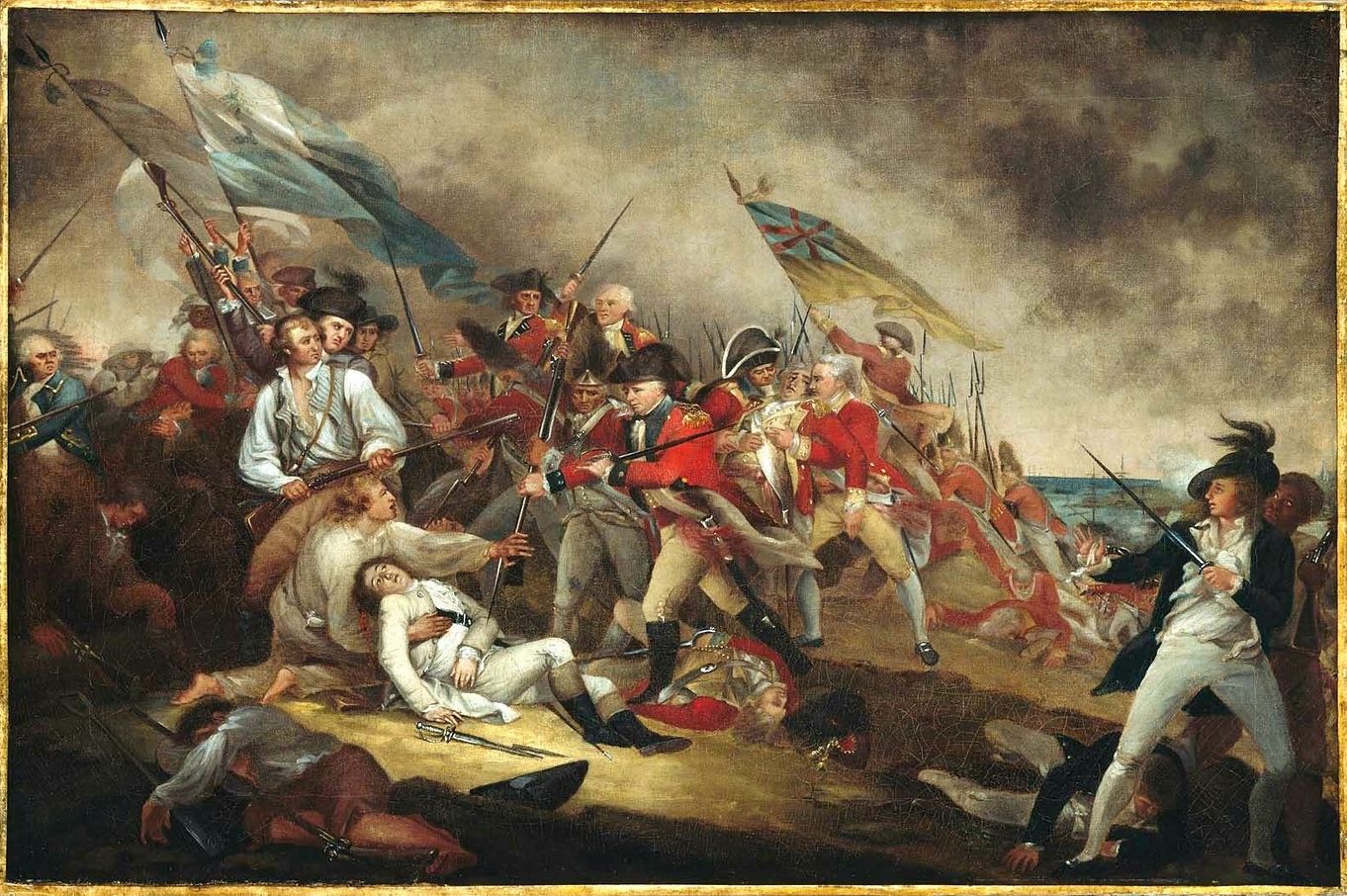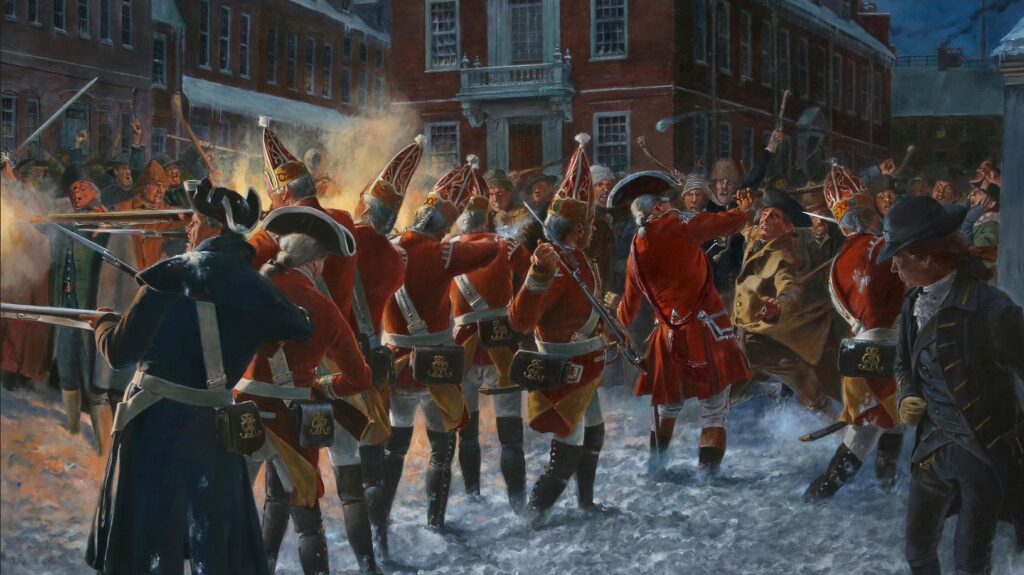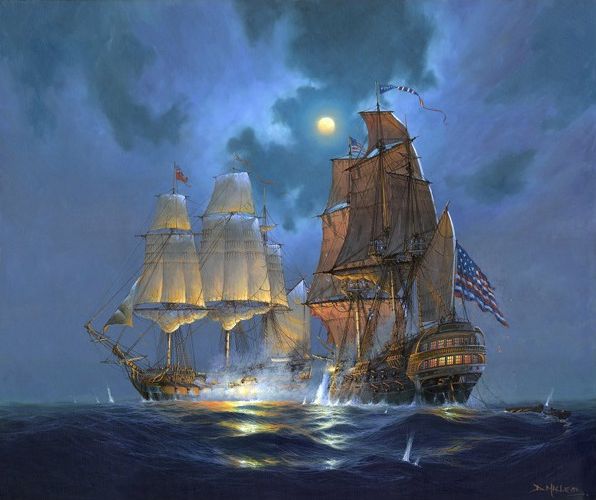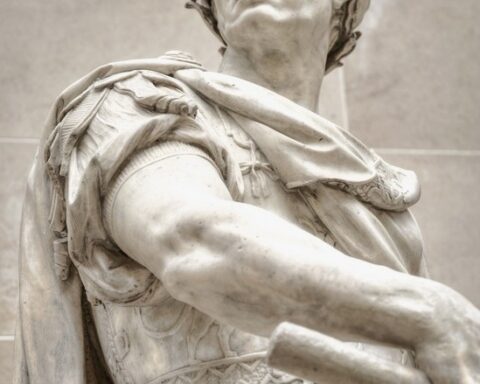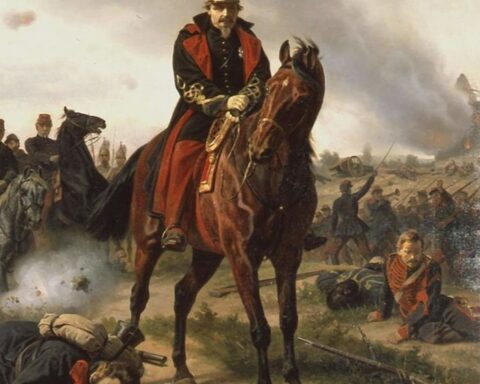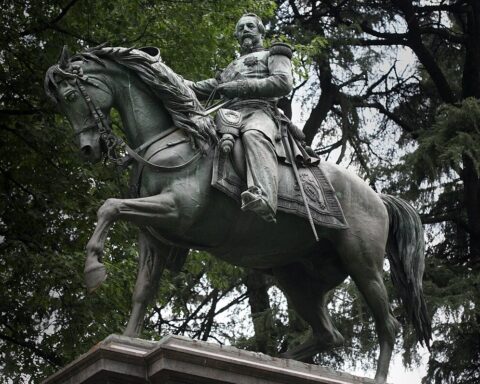Editor’s note: The following — a British perspective on the American Revolution — is extracted from The United States: An Outline of Political History, by Goldwin Smith (published 1893).
(Continued from Part 2)
The war opened at Boston, where General Gage, now its military governor, lay with a small army of occupation and repression, and it opened in a way ominous of the final result and significant of the means by which the result was to be brought about. Gage sent out a detachment to seize rebel stores at Lexington. The militia of the country, called Minute Men because they were always to be in readiness, excellent sharp-shooters, swarmed out, surrounded the detachment, and forced it to fall back with loss on Boston. The next engagement was more ominous still. The patriots occupied Breed’s Hill (not Bunker’s Hill, but an adjoining height), which commanded Boston, and fortified it with a redoubt and breastwork. It seems that they might have been dislodged by manoeuvring. But the royal commander, in his pipe-clay pedantry and pride, chose to lead his men on a hot summer’s day with heavy knapsacks on their backs up the front of the hill against the breastwork. Thrice they mounted in face of the fire of the sharp-shooters, who from under cover securely shot them down. The third charge took the position, and a captured gun stands on the citadel of Quebec as the trophy and proof of royalist victory; but the loss had been immense and the moral advantage was with the insurgents. Gage now gave place to Howe, and Howe found himself surrounded in Boston by swarms of Minute Men who were presently under the command of a good general. The appointment of Washington as commander-in-chief of the Continental forces was a politic compliment to Virginia, but it was also by far the best appointment that could be made. Washington when a stripling had made a wonderful mark, not only as a soldier in border war against the Indians, but as a negotiator; while in Braddock’s disaster he had shown a fortitude and steadfastness in defeat which were to be inestimable in his present place. Having suffered in military grade and in feeling so as to be led to resign his position by the exclusive precedence of the royal officers, he would not be unwilling to measure swords with them in the field. He found an army undisciplined, impatient of control, ill-equipped, unprovided with ammunition. But he managed to hold this army together, to present a front which to his surprise his unenterprising enemy respected, and at last on a dark night to seize and fortify an eminence which commanded the place and rendered it no longer tenable. Howe evacuated Boston, where redcoats never appeared more.
In leaving Boston the royal fleet took with it, according to Mr. Sabine, eleven hundred loyalists, including women and children, the first instalment of a great loyalist migration. The number included, of members of the Council and officials, one hundred and two; of clergymen, eighteen; of inhabitants of country towns, one hundred and five; of merchants and other residents in Boston, two hundred and thirteen; of farmers, mechanics, and traders, three hundred and eighty-two. The case of these people is not to be settled, nor is the witness which they bore to their cause to be annulled, by designating them as Tories. Was it just that they should be outlawed, pillaged, driven from their homes, maltreated, condemned to the death of traitors by men who had but yesterday been conspirators, outwardly professing allegiance to the government to which the loyalists adhered, and were still without any recognized government of their own? Were not the loyalists Americans, and did not their wrongs exceed any of those done to Americans by the king? On the eve of the civil war in England, Sir William Waller the Parliamentarian, wrote to Sir Ralph Hopton the Royalist: “My affections to you are so unchangeable that hostility itself cannot violate my friendship to your person, but I must be true to the cause wherein I serve. The old limitation of usque ad aras holds still. . . . The great God, who is the searcher of my heart, knows with what reluctance I go upon this service, and with what perfect hatred I look upon war without an enemy. But I look upon it as opus domini, and that is enough to silence all passion in me. The God of Peace in His good time send us peace, and in the meantime fit us to receive it! We are both on the stage and we must act the parts that are assigned us in this tragedy. Let us do it in a way of honour, and without personal animosities.” Such was the spirit of men mournfully obeying in a great cause the inevitable call of civil war. There was little of it on either side in the American Revolution.
The loyalists retaliated when they could; where they were strong they became the aggressors, and as their party included, with some of the chiefs of society, many of the lowest and wildest class, they rivalled and probably outvied their opponents in atrocity. The civil strife grew more murderous and viler as it went on. “The animosities between Whigs and Tories,” wrote the worthy American General Greene, “render their situation truly deplorable. The Whigs seem determined to extirpate the Tories and the Tories the Whigs. Some thousands have fallen in this way in this quarter and the evil rages with more violence than ever. If a stop cannot be put to the massacres, the country will be depopulated in a few months, as neither Whig nor Tory can win.” “The people of the South,” says Chief Justice Marshall, “felt all the miseries which are inflicted by war in its most savage form. Being almost equally divided between the two contending parties, reciprocal injuries had gradually sharpened their resentment against each other and had armed neighbour against neighbour until it had become a war of extermination. As the parties alternately triumphed, opportunity was alternately given for the exercise of their vindictive passions.” Even in the Wars of the Roses, amidst the mutual butcheries of the aristocratic factions the common people had been spared and had spared each other. Nor were the royal officers now behind in cruelty. They bombarded seaboard towns, and in their executions of relapsed rebels violated the humanities if not the laws of ordinary war. Between rebellion and belligerency there is a doubtful period during which the agents of government think themselves licensed to give way to their passions under the name of crushing treason. Among the loyalists of the baser sort some exercised brigandage in the name of the crown. The devilry was completed by the introduction of Indians, whose ferocity no commander could restrain, though Carleton and Burgoyne did their best. They had been enlisted first by the colonists, so that Chatham’s tremendous invective was misplaced saving as such a policy might be more disgraceful to a government than to rebels. The horrors of Wyoming, painted both in verse and prose, were the work of Indians led on by a band of Tories who had themselves been driven from their homes.
John Adams has given us an account of the doings at Philadelphia while the politicians were hatching the revolution. In the evening at Mr. Mifflin’s there was “an elegant supper and we drank sentiments till eleven o’clock. Lee and Harrison were very high. Lee had dined with Mr. Dickenson and drank Burgundy the whole afternoon.” From nine in the morning till three in the afternoon the delegates attended to business, “then they adjourned and went to dine with some of the nobles of Pennsylvania at four o’clock, and feasted upon ten thousand delicacies, and sat drinking Madeira, Claret, or Burgundy till six or seven, and then went home fatigued to death with business, company, and care.” It is a pity that in such cases there cannot mingle with the flavour of the Claret and Burgundy a foretaste of the bitterness of civil war. But the politicians who quaff the wine too seldom drink of the other cup.
Meantime the colonists had grasped at Canada, which they thought would fall into their arms. Among the charges originally levelled by New England against the king’s government was that of having by the Quebec Act established in Canada Roman Catholicism, which New England stigmatized as a religion that had “drenched Great Britain in blood and disseminated impiety, bigotry, persecution, murder, and rebellion through every part of the world.” Afterwards the colonists, desiring to draw Canada into their league, addressed her in a different strain, setting forth how under the blessed influence of republican liberty Roman Catholicism and Protestantism might dwell together in the sweetest peace. But the Canadian clergy, having both manifestoes before them, believed in the genuineness of the first, which was more in accordance with the practice and even with the laws of Massachusetts. They advised their people to adhere to Great Britain or at least to be neutral, and their influence was seconded by the conduct of Sir Guy Carleton, a wise, brave, and popular governor. The Americans finding honeyed words unavailing, invaded Canada and took Montreal, but they were repulsed in a daring attack to storm Quebec in which their general, Montgomery, fell and Canada was lost to the Union.
From Boston the scene of war shifted to New York, where royalism was strong, and neutrality still stronger, especially in the commercial class, while by occupying that position the confederacy might be cut in two. Washington had here concentrated his forces and fortified himself. On Long Island patriotism for the first time met discipline in the open field and was driven in flight before it. Had Howe followed up his victory there probably would have been an end of the Continental army, whatever local resistance might have survived. But Howe, there can be little doubt, was wavering as well as lethargic and instead of pressing his enemy he went to luncheon. New York was taken. Some of the patriots had proposed to burn it, “since,” as General Greene said, “two-thirds of the property of the city and suburbs belonged to the Tories.” It was fired, but was saved by the captors and remained the centre of royal operations to the end of the war. Howe’s subsequent conduct seems to have been marked with a sluggishness and irresolution which the energy of his lieutenant, Cornwallis, could not redeem. Washington was allowed to pluck victory and reputation out of the jaws of defeat by surprising two battalions of Hessians who were sleeping off their Christmas debauch at Trenton, and overwhelming after a masterly movement two isolated regiments at Princeton. All this restored the confidence of the revolutionists and raised their military character in Europe, notably in France, while the excesses of Howe’s mercenaries turned the Jerseys back from royalism to revolution. At last Howe moved, and having defeated Washington at the battle of the Brandywine entered Philadelphia, the capital of the confederacy, where he was well received and passed a highly festive winter. Washington attempted a surprise but was again defeated, though not with ease, at the battle of Germantown. Notwithstanding Washington’s reverses, with him remained the honours of the campaign.
Howe, feeling, probably, that in spite of his successes in the field the attempt to subdue the colonists was a failure, and having achieved as little by diplomatic offers of reconciliation as by force, went home and was succeeded by Sir Henry Clinton. Washington had taken up his quarters for the winter near his enemy, in an unassailable position among the hills at Valley Forge. This winter at Valley Forge is the most heroic episode of the revolution. Washington’s men, more the men of Washington than the men of the revolution or the Congress, were left without meat for days together, sometimes without bread; without blankets, so that they had to sit up by their campfires to keep themselves warm; and without shoes, so that the traces of their march over the snow were marked with blood. Yet they showed of what race they were by holding together and making their foe beware of them. During the winter they went through a course of drill under Steuben, a Prussian, and other foreign officers, which put them on a level with the king’s soldiers, their natural qualities being the same.
Washington was to the confederacy all in all. Without him it would have been ten times lost, and the names of the politicians who had drawn the country into the conflict would have gone down to posterity linked with defeat and shame. History has hardly a stronger case of an indispensable man. His form, like all other forms of the revolution, has no doubt been seen through a golden haze of panegyric. We can hardly number among the greatest captains a general who acted on so small a scale and who, though he was the soul of the war, never won a battle. In that respect Carlyle, who threatened “to take George down a peg or two,” might have made good his threat. But he could not have stripped Washington of any part of his credit for patriotism, wisdom, and courage; for the union of enterprise with prudence; for integrity and truthfulness; for simple dignity of character; for tact and forbearance in dealing with men; above all for serene fortitude in the darkest hour of his cause and under trials from the perversity, insubordination, jealousy, and perfidy of those around him severer than any defeat. Some American writers seem anxious to prove that Washington’s character is essentially different from that of an English gentleman. About this we need not dispute. The character of an English gentleman is certainly devoid of any traits that might be derived either from a plantation or from war with Indians in the backwoods. Yet an English gentleman sees in Washington his ideal as surely as he does not see it in Franklin, Samuel Adams, or Patrick Henry. It has been truly said that Washington and Wellington have much in common. Wellington contending with Spanish perversity and ministerial incompetence reminds us by his calmness and self-control of Washington contending with the folly and dishonesty of Congress and the fractiousness of the state militia. They write in the same even, passionless, and somewhat formal style, the expression of a mind always master of itself. In both of them there was, though under control, the strong temper which is almost inseparable from force. Wellington might be more of an aristocrat than Washington, less of a democrat he could hardly be. Washington insisted that his officers should be gentlemen, not men fit to be shoeblacks. He drew a most undemocratic distinction between the officer and the private soldier. His notions about the private soldier are those of an old world disciplinarian. He says that the soldier should be satisfied to serve for his food, clothes, and pay, and complains that he cannot lay on the back of the insubordinate patriot more than one hundred lashes, holding that five hundred are not too many. The other army leaders, Gates and Lee, caballed against him and were abetted by politicians morbidly or perhaps selfishly jealous of military ascendancy. It appears that both Samuel and John Adams, if they did not intrigue, were unfriendly to Washington and would willingly have seen him superseded. Washington bore the attacks on him magnanimously, never allowing his personal wrongs to interfere with his duty nor ever thinking of abandoning his post. Perhaps in the whole conflict the three noblest things are the character of Washington, the behaviour of his army at Valley Forge, and the devotion of the better class of loyalists. On Washington’s death the flags of the British fleet under Lord Bridport were half-masted. We owe the American Hildreth thanks for recording the fact.
A plan had been formed by the British war office for a movement from Canada down the valley of the Mohawk upon the Hudson, so as to break the centre of the confederacy. Burgoyne, who seems to have been the originator of the plan, was put in command. He had won some distinction in war, but was more of a wit, a playwright, and a social star than a captain. Down the valley of the Mohawk he came with six or seven thousand regulars, British and German, some Canadian auxiliaries, and a train of Indians. The royal general at New York was to have moved out to meet him, but the despatch was not sent in time because, as tradition has it, Lord George Germaine had chosen to hurry off to his pleasures instead of waiting till the clerks had done their work. Burgoyne took a wrong course, lost himself in a tangled country, found no Clinton to meet him, was deserted by his Canadians and Indians, and was surrounded by the local militia, famous bush-fighters and riflemen, who poured out in defence of their own states. Here was seen the strength of the local resistance in contrast with the weakness of the confederation. Hemmed in by swarms of sharp-shooters, whose number was four times his own, and unable to get open battle, Burgoyne was forced to surrender. This he did under a convention providing that he and his troops should be sent to England under parole not to serve against America. It occurred to Congress that the troops, though they could not be used against America, might be used in setting other troops free for that service. On pretexts utterly frivolous and disowned by the American commander Congress broke the convention, detained the troops, and against the laws of war tried to entice the men into its own service. It was a violation of public faith for which no real excuse has been offered. Nor did Congress stop here. It insisted that the sum which had been expended in provisions for the captured army in Continental paper should be repaid in gold three times the paper’s worth, and this while it was treating the refusal of the paper as a crime. “Jay,” ejaculated Governeur Morris thirty years afterwards, “what a set of d-d scoundrels we had in that second Congress!” “Yes,” said Jay, “we had,” and he knocked the ashes from his pipe. It seems that when Congress had sunk into impotence and discredit some of the best men left it to employ their energies in their own states, probably the best of all were in the field. From Gates and from Schuyler of New York, to whom Burgoyne surrendered, he and his troops received chivalrous treatment. When they got to Boston there was a change. Madame de Riedesel, the wife of the German general, complains that she was cruelly insulted by the Boston women. In her memoir we are told that the wife and young daughter of Captain Fenton, a royalist absentee, were stripped naked, tarred and feathered, and paraded through the city. The Americans on their side had too much reason to complain of the cruel treatment of prisoners at New York by royal commanders at New York who had no pity for those whom they still deemed rebels, or Tory officials made merciless by the rage of faction. Such is civil war. There is no test of the humanity of a nation so trying as civil war. We have to wait till a later period to see that the test might be borne.
Clinton presently evacuated Philadelphia and fell back on New York, which remained in the king’s hands to the last. On the march he fought a drawn battle with Washington at Monmouth Court House, in which the improved drill of Washington’s soldiers showed its effect. He took with him from Philadelphia three thousand loyalists who dared not fall into the hands of the Whigs. Of those who remained behind a number were condemned to death, but two Quakers only were hanged.
(Continued in Part 4)

